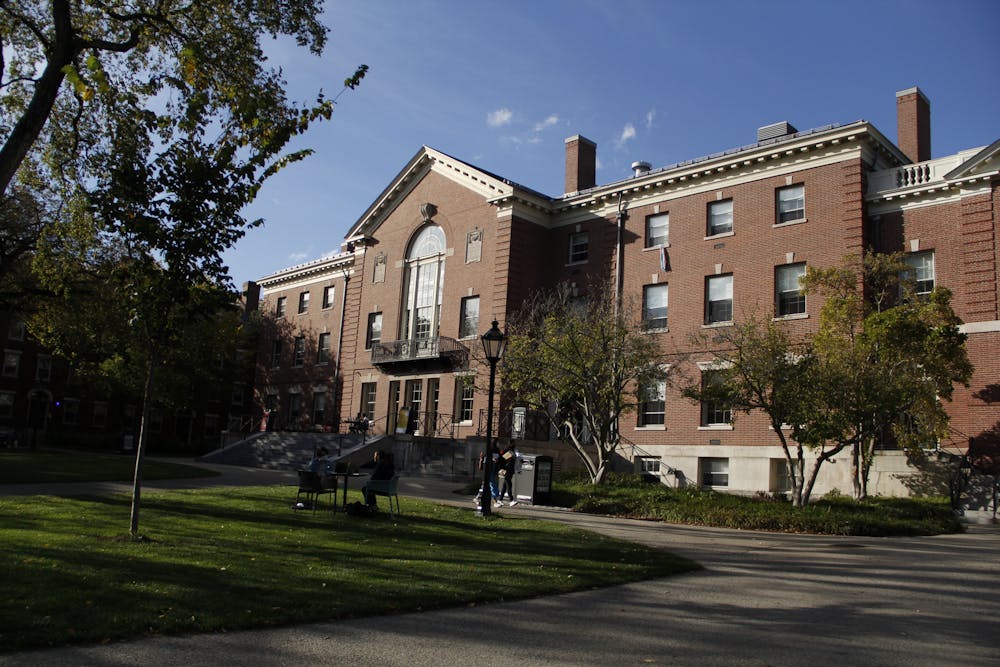The Undergraduate Council of Students formally endorsed Sunrise Brown’s DIRE campaign at a Wednesday town hall in the Stephen Robert ’62 Campus Center.
At the meeting, Sunrise Brown representatives presented on their February report, which looks at the University’s alleged ties to “fossil fuel-affiliated and climate disinformation-affiliated organizations” and calls for them to “dissociate” from the fossil fuel industry. Along with dissociating, the DIRE campaign additionally demands that the University “reinvest” in Rhode Island communities.The motion to endorse the campaign passed unanimously at the end of the meeting.
The town hall was organized by Daniel Newgarden ’25, UCS chair of academic affairs, who hosted a similar town hall last semester when Sunrise Brown circulated a petition calling for candidates for the then-open provost position to commit to the University’s environmental pledges.
“Sunrise (Brown) are really the main drivers of this,” Newgarden said. UCS, though, is officially recognized by the University and can “put (demands) in language that the administration might, in theory, be more willing to accept,” he said.
Sunrise Brown organizer Isaac Slevin ’25 described the meeting as “an amazing opportunity to work with elected representatives who have (the ability) … to hash things out between the students and the administration.”
“Since (UCS representatives) are elected by students and are representing their opinions, I think it’s just a much larger show of the student body’s support for any sort of climate action at Brown,” Sunrise Brown member Ava Ward ’25 said.
Sunrise Brown’s presentation outlined their definition of dissociation, which calls for “the termination of all financial and social ties with fossil fuel corporations, as well as their affiliated foundations and industry groups,” according to the slides presented at the event.
The University announced that it had eliminated all exposure to fossil fuels in its endowment in March 2020.
The presentation also reiterated the campaign’s three demands: prohibiting “fossil fuel companies from funding research and donating to the University,” “adopting a fossil fuel-free careers policy” and requiring “fossil-free … retirement plan options.”
According to the report, Brown-affiliated researchers have contributed to at least 63 research articles published since 2010 with “sponsorship from at least one of the top 50 companies by total fossil fuel production on the Urgewald Global Oil and Gas Exit List or the Global Coal Exit List.”
The report could only confirm that Brown-affiliated researchers received fossil fuel-associated funding in five articles and was unable to make a determination for the other 58.Baylor Fox-Kemper, professor of earth, environmental and planetary sciences, told the crowd at a rally for DIRE last week that he accepted a research grant from British Petroleum following the Deepwater Horizon oil spill aimed at measuring its impacts — before promising he would never “take fossil fuel money again” — The Herald previously reported.
“We shouldn’t be taking any money from the companies that are causing the spills in the first place,” said Sunrise member Marlena Brown ’25 “All it’s doing is legitimizing an industry Brown shouldn’t be associated with.”
The University has received the Sunrise Brown report and “our next step will be to review it in full,” University Spokesperson Brian Clark previously wrote in an email to The Herald.
At the town hall, UCS President Ricky Zhong ’23 asked Slevin how much money the University receives from fossil fuel companies. It’s “hard to tell,” Slevin said, “because Brown won’t release the data.”
While Sunrise cannot calculate the total amount of research funding the University received from fossil fuel companies, presenters shared their findings that Brown received “more than $20,000,000 worth of contributions from non-profit organizations affiliated with the fossil fuel industry” between 2003 and 2019. The group was able to get this data because of financial reporting requirements for non-profit organizations, according to Slevin.
Presenters described past examples of universities dissociating from the fossil fuel industry, such as Princeton’s announcement that it would dissociate from 90 companies in the “thermal coal or tar sands segments of the fossil fuel industry” last year, which Ward described as “a big inspiration” for Sunrise Brown.
“Nobody’s done complete dissociation like we (want), but we’re not alone,” Slevin said. “We’re confident that Brown could become the first school in the U.S. to dissociate from fossil fuels.”
Following the meeting, Newgarden said he plans to forward the approved resolution to President Christina Paxson P’19 P’MD’20 and Interim Provost Larry Larson so that “they can’t deny that students and elected representatives of the student body actually support it.”
Indigo Mudbhary is a University news senior staff writer covering student government. In her free time, she enjoys running around Providence and finding new routes.





